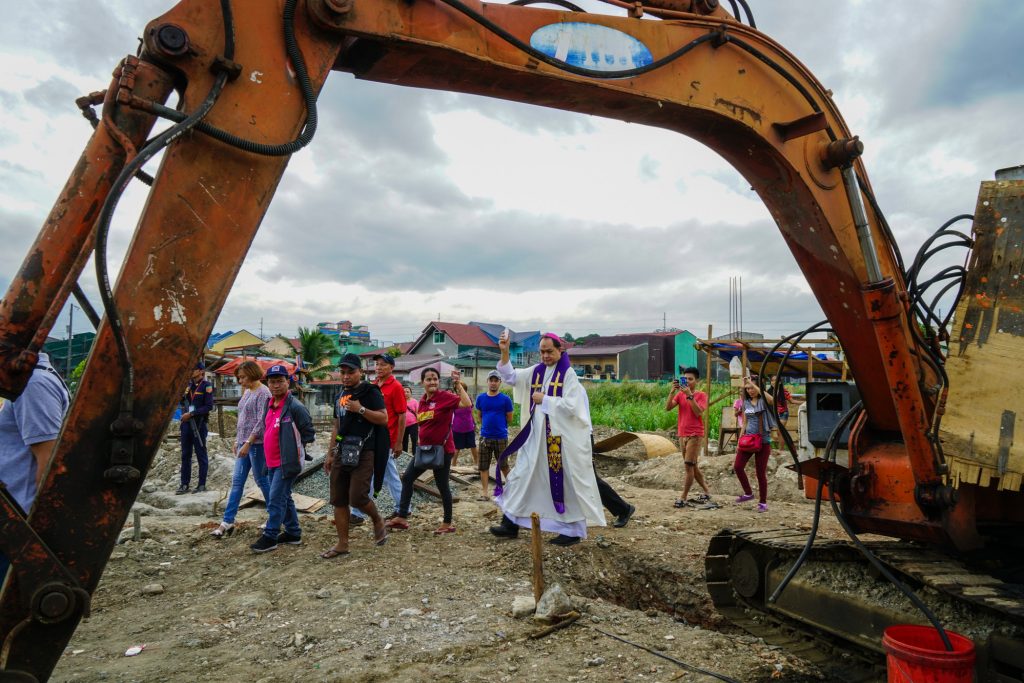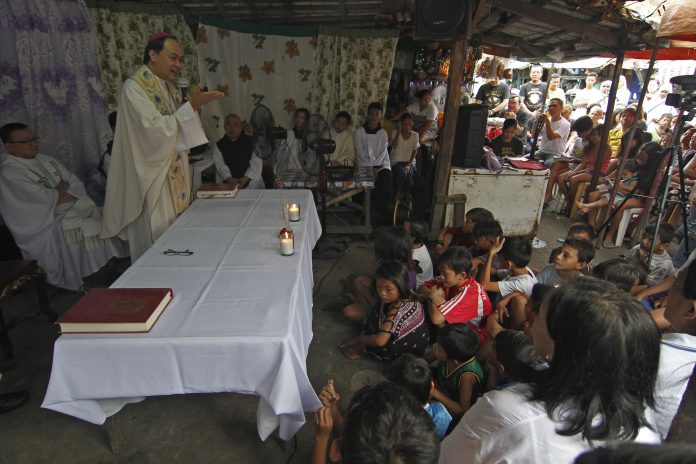“If you pull up the weeds, you might uproot the wheat along with them.”
This is a good reminder to those who are overzealous about getting rid of what they call “bad elements” in society. Even with the best of intentions, sometimes they end up doing more harm than good. You see, in this world, good intentions are not enough. Good discernment is the more important tool for dealing with evil in this world.
Why does the owner of the field in the parable not agree with the solution being proposed by his workers? Here is his reasoning: “If you pull up the weeds, you might uproot the wheat along with them.” Like I told you a few days ago, evil is a trying hard copycat. The devil always appears like an angel in disguise. The weeds can make themselves look like wheat.
Sometime ago, somebody was asking me about the mission stations that we have established in the slum communities in our diocese, which we call “Church presence among the poorest of the poor.” The person was alarmed to know that some of the people I assign as chaplains in these mission stations are nuns, meaning, women in consecrated life. He said, “How do you insure their safety? You mean you assign them to live right there in the slums? Surrounded by addicts and drug dealers and criminals? How do you protect them from the thugs in the street alleys?”
I am sure the person meant well. But I realized that he had a caricature image of life in the slum communities as places infested with all the bad elements of society. I told him that even the thugs in the street alleys greet our sisters good morning or even ask for their blessing (make mano po to them) when the sisters pass by.
When we see evil around us, we sometimes get overwhelmed. Like when we hear of scammers, akyat-bahay burglars, swindlers, rapists, or abusers, or guns for hire who kill people like chickens. Like the workers of the field, we sometimes feel like asking God, “Lord, we thought that everything you created was good, as is written in the Bible. Where does all this evil come from?” And the answer remains the same, “This is the work of an enemy.”
That enemy is the Evil One, whom we all are asked to renounce in our baptismal promises: “Do you renounce Satan?” If we believe that this world and the people around us are essentially good, then it means we have to distinguish between the action and the person. Isn’t that what you say, as a parent, when your child does something bad? It can happen that because you got angry with them, they may think that you hate them. A good parent would sometimes try to explain, “No my child, I hate only what you did and it is what I am angry about, not you. I had to call your attention about it, precisely because I love you and care for you.” And so you see, sometimes, anger can be also an expression of love.
Our basic principle as Christians is that all people are by nature good. When good people do something bad, it does not mean they are bad people. We distinguish between the person and the action. One of the Psalms expresses this well: “If you O Lord should mark all our sins, who can stand?” (Ps 130:3) The Lord’s love and mercy for the sinner is always greater than his hatred for the sins.
I think this is the reason why Jesus, in his Sermon on the Mount, taught his disciples, “Do not judge and you shall not be judged. Do not condemn and you will not be condemned. Forgive, and you shall be forgiven.” The master did not allow the workers to play judge, even with the best of intentions, precisely because they could end up doing more harm to what is good, in their hatred for evil.

You know that a society remains humane when, even in its desire to get rid of criminality, it can still respect the human rights of the offenders. You have heard me many times, appealing for drug users, even if we know the kind of crimes that some of them might be capable of doing. We can rehabilitate them. We cannot judge their persons because we are not in their shoes. We do not know what kind of life they’ve had.
Yes, we can enforce the law but still remain humane by treating the offenders not as people who are evil but as people who have committed something evil. The distinction saves us from the tendency to play god or act as a judge and executioner at the same time. Even judges don’t judge persons; they only judge the actions of the accused. That is why even modern penology in civilized societies is reorienting itself from punishment to restorative justice.
The moment we get used to classifying people themselves into good and bad elements, that’s when we can quickly turn into executioners. The battle between good and evil happens inside all of us. In short, we are not the seeds; we are the fields. In some fields the good seeds are obviously overpowered by the weeds.
One of my inspirations for this thought is the novel “Les Miserables” by Victor Hugo, which is now better known as a theater musical. It is about an ex-convict named Jean Valjean, who is reformed, because of a little act of kindness done to him by a clergyman. In the background of the story, there is a cruel law enforcer named Javert who makes it difficult for Jean Valjean to live a normal life again in society. He does not believe that a criminal can be reformed.
The story revolves around the peasant Jean Valjean who had just been released from 19 years’ imprisonment —five for stealing bread for his starving sister and her family and an additional 14 years for several attempts to escape. He is turned away by innkeepers because his identity card marks him as an “ex-convict”. He sleeps on the street, angry and bitter.
One day, a kind-hearted pastor takes pity on him, gives him shelter and warm food for the night. But Valjean is tempted to steal his host’s silverware. He is caught by the policemen who make fun of him for his fantastic story that the silverware had been given as gift to him by the pastor. To his great surprise, the bishop affirms his story and saves him from another imprisonment.
Let me quote some lines from the dialogue of the pastor to the ex-convict, after the police release him:
“But remember this, my brother, see in this some higher plan. You must use this precious silver to become an honest man.”
“By the witness of the martyrs, by the Passion and the Blood, God has raised you out of darkness. I have saved your soul for God!”
Les Miserables is Bishop Pablo Virgilio David’s homily for July 19, 2020, 16th Sunday in Ordinary Time (Matthew 13:24-43). Bishop David is prelate of the Diocese of Kalookan and acting president of the Catholic Bishops’ Conference of the Philippines.









